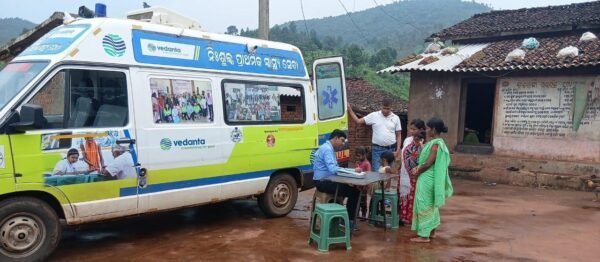Bhubaneswar, Odisha; 16th August 2025: Vedanta Aluminium, India’s largest aluminium producer, is reshaping rural healthcare in Odisha by steering a shift from treatment to prevention and awareness. Through its Mobile Health Unit (MHU) program, the company is working across Rayagada and Kalahandi districts to equip rural households with knowledge, practices, and confidence to safeguard themselves against common health risks well before illnesses strike.
In its latest outreach drive, the program engaged over 1,500 residents in multiple villages with free malaria screenings and practical guidance on early symptom detection. Doctors and health workers emphasized preventive actions such as clearing stagnant water, maintaining proper sanitation, and using mosquito nets correctly. These steps, though simple, have the power to drastically reduce the incidence of vector-borne diseases in vulnerable rural communities.
Recognizing the central role of women in family and community health, Vedanta has gone further by training 80 members of Self-Help Groups (SHGs) from five villages. These women have undergone structured workshops on household hygiene, clean water practices, first aid, and snakebite response. Today, they serve as local health champions, counseling neighbors and families, and ensuring that life-saving knowledge spreads organically within the community.
One of the participants, a woman from Kalahandi, explained how the training has changed her role, “Earlier we waited for outside help in emergencies. Now, we know what to do immediately, whether it is a fever, a snakebite, or an injury. People in my village now come to me for advice, and I feel proud to help.”
The Mobile Health Units themselves form the backbone of this initiative. Each MHU is staffed with a doctor, nurse, pharmacist, and lab technician, and is equipped to provide both preventive and curative services. In the past two years, these units have conducted more than 2,000 health camps, reaching 20,000 people in 35 villages. Services include free medical check-ups, distribution of medicines, diagnostic testing, and referral support for serious cases. Importantly, each camp also features interactive awareness sessions designed to encourage preventive habits and dismantle myths around illnesses.
Local residents are already noticing a difference. Villager Nabin Naik shared his experience, “Earlier, we would only seek help after falling sick. Now, we know how to avoid many problems before they happen. Children in our homes are healthier because we follow hygiene practices we learned from the health camps.”
Speaking about the vision behind the program, Rajiv Kumar, CEO of Vedanta Aluminium, said, “True healthcare begins with awareness. By embedding preventive practices at the grassroots, we are creating stronger, healthier communities equipped to manage seasonal and long-term health challenges. Our Mobile Health Units are more than mobile clinics, they are vehicles of empowerment, giving people the knowledge and resources to take charge of their well-being.”
Vedanta’s approach reflects a broader shift in rural healthcare strategy: from dependency on external intervention towards community-driven resilience. By empowering women, strengthening awareness, and providing mobile access to medical expertise, the company is ensuring that rural families not only have treatment within reach but also learn how to prevent disease in the first place.
With seasonal illnesses like malaria, diarrheal diseases, and respiratory infections still posing significant risks in rural Odisha, such preventive, people-centered efforts are vital. As local champions continue to spread awareness, and MHUs bring consistent support, Vedanta Aluminium is demonstrating how corporate initiatives can play a transformative role in rural health systems laying the groundwork for communities that are healthier, more confident, and self-reliant.


